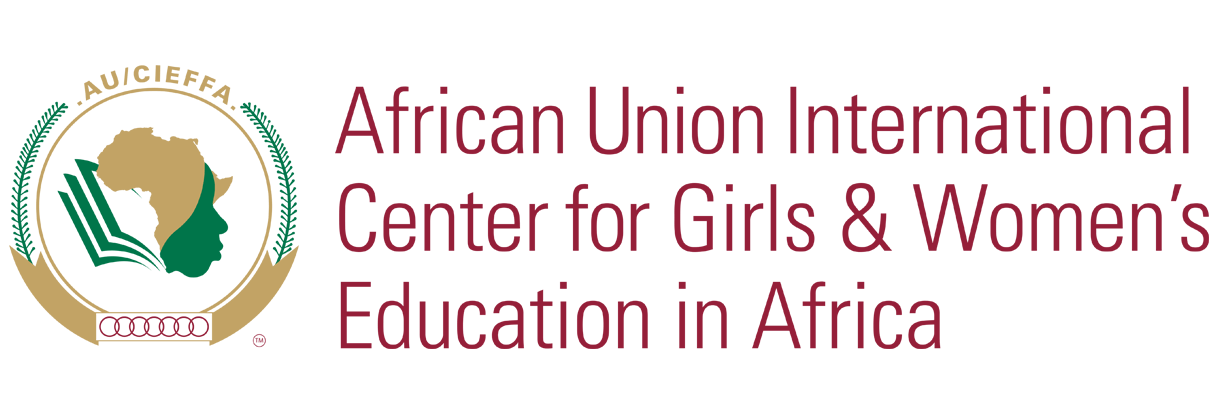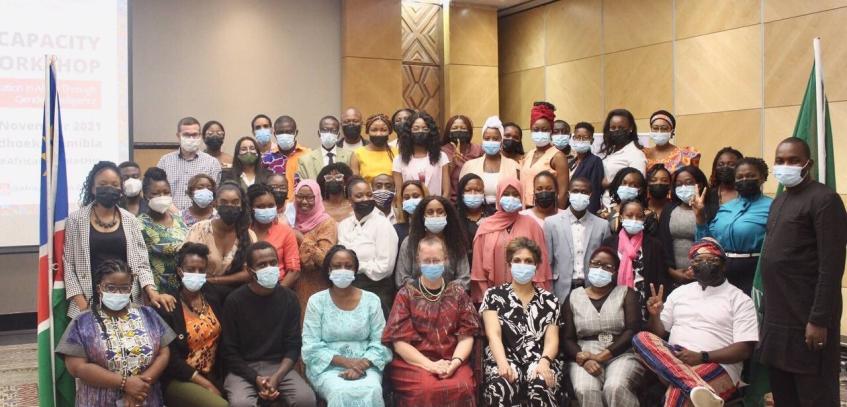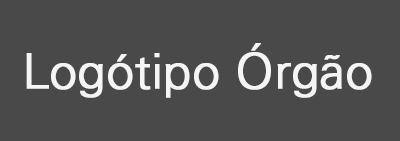40 youth from across the AU Member States convened at the Windhoek Country Club and Resort on the 27th of November 2021 for the official opening of the African Union International Centre for Girls and Women’s Education in Africa’s (AU/CIEFFA) 4th Youth Capacity Building Workshop (YCBW) happening under the theme “Scaling Up Girls and Women’s Education in Africa Through Gender Intelligence” happening in Namibia from the 27th – 30th of November 2021.
The YCBW program was launched in 2017 and boasts of over 200 youth Alumni championing girls and women’s education in Africa. This year’s cohort of participants is made up of teachers and journalists, aligning with AU/CIEFFA’s Strategic Plan 2021 – 2025 which recognizes teachers and journalists as key influencers in the promotion of girls’ education and retention of girls in school.
Dr Rita Bissoonauth, Head of Mission, AU/CIEFFA, gave participants the history of how the AU/CIEFFA, a specialized institution of the African Union (AU), was created. She stated that the institution works closely with the AU Member States through relevant Ministries of Education, Gender, Science and Technology, and others to promote the implementation of gender equality and equity in Africa’s education systems. In addition to working with African governments, the AU/CIEFFA works with international development partners, traditional and religious leaders, Civil Society Organizations (CSOs) and youth.
”Youth constitute over 60% of Africa’s population and are key stakeholders in ensuring that girls access education, stay in school and complete the mandatory 12 years of education...that is why we are here, we are empowering you to be leaders of tomorrow.”
The Representative of the Permanent Mission of Norway to the AU, Ms Vigdis Cristofoli, joined the opening ceremony via video and expressed Norway’s commitment to supporting the African Union’s girls and women’s education agenda spearheaded by the AU/CIEFFA. She reflected on how girls’ education has had a positive impact on Norway’s economy and emphasized the importance of ensuring education is accessible for all. Ms Vigdis reiterated that “Education for skills and work for the young generation must be prioritized.”
In her keynote speech, Professor Sarah Ayang, Commissioner, AUESTI, highlighted how African leaders like the late Ghanaian President, H.E. Nkwame Nkrumah and the late President of Tanzania, H.E. Julius Nyerere began their careers as teachers and continued to prioritize education as the basis of development. She alluded that the status of the teacher in Africa is very important to achieving the vision of Agenda 2063 of integration, peace and prosperity by facilitating the acquisition of requisite skills, values and attitudes. Addressing young journalists she shared he belief “in the transformational role that media can play in achieving gender equality by creating gender-sensitive and gender transformative content.”
In closing the opening ceremony, Ms Edda Bohn, the Deputy Executive Director for Education in the Ministry of Education, Arts and Culture, Namibia, again welcomed participants to Namibia and shared the challenges and successes Namibia has had in ensuring education for all and gender equality in education since its independence in 1992.
“Since independence, we have managed to increase the enrolment at senior secondary...these days we count over 822,000 learners in schools taught by a female-dominated teaching force of more than 30,000 teachers in 1,947 schools.” Ms Bohn said
The opening ceremony was followed by a series of training sessions which included Gender Stereotypes facilitated by Dr Rita Bissoonauth, an Overview of data on girls and women’s education in Africa and how to use data to improve the teaching profession led by Nenad Tomic from UNICEF Namibia, Advocating for Girls’ Education; Story-telling and Gender Data Journalism led by Gabriel Nghiinomenwa, Data Journalist. Munyaradzi Dodo, from Magamba Network, will lead participants in an #IdeaTHON, a concept borrowed from Hackathons, where participants will be assigned into groups and will come up with civic solutions that address issues around girl and women’s education in Africa over the next four days.
Throughout the workshop participants will learn and gain skills on legal literacy and the implications of regional and international instruments on girls and women’s education, linking gender intelligence to education, how to incorporate the Arts into Science, Technology, Engineering and Mathematics (STEM), creating engaging digital content, Artificial Intelligence, and how to use online resources for effective teaching.
For more information contact:
Anoziva Marindire| Communications Officer | African Union International Center for Girls & Women's Education in Africa |Email: MarindireA@africa-union.org
Boubakar Yougbare| Programs Officer |African Union International Center for Girls & Women's Education in Africa |Email: BoubakaryY@africa-union.org










